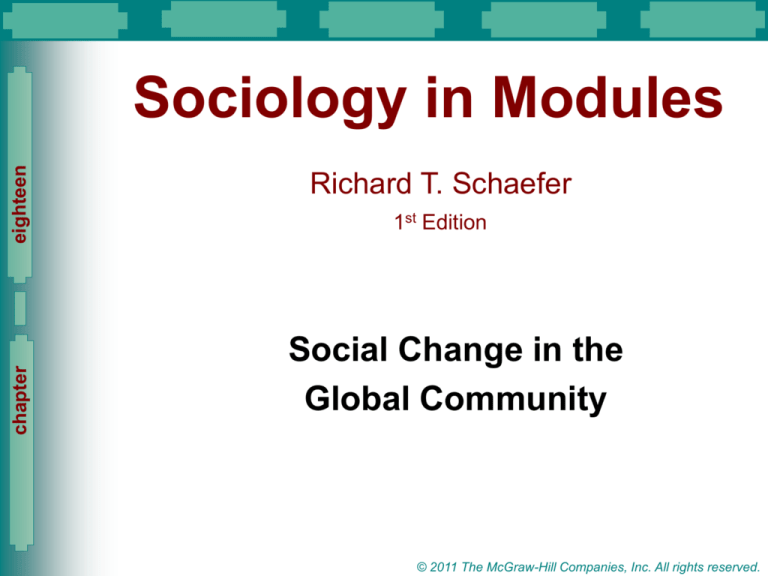
Slide 1
chapter
eighteen
Sociology in Modules
Richard T. Schaefer
1st Edition
Social Change in the
Global Community
© 2011 The McGraw-Hill Companies, Inc. All rights reserved.
Slide 2
Social Change in the
Global Community
18
•Module 55: Social Movements
•Module 56: Social Change
•Module 57: Global Social Change
© 2011 The McGraw-Hill Companies, Inc. All rights reserved.
Slide 3
A Look Ahead
█
█
█
How does social change happen?
Is the process unpredictable, or can we
make certain generalizations about it?
Has globalization
contributed to social change?
© 2011 The McGraw-Hill Companies, Inc. All rights reserved.
Module 55
Slide 4
Social Movements
█
Social movements: organized
collective activities to bring about or resist
change in an existing group or society
– Social movements have had dramatic
impact on course of history and
evolution of social structure
– Functionalists: provide training grounds
for leaders of political establishment
– Increasingly taking on
international dimension from the start
© 2011 The McGraw-Hill Companies, Inc. All rights reserved.
Module 55
Slide 5
Relative Deprivation Approach
Relative deprivation: conscious
feeling of negative discrepancy
between legitimate expectations
and present actualities
█ Before discontent is channeled into a
social movement, people must feel they:
█
– Have a right to their goals
– Perceive they cannot attain goals
through conventional means
© 2011 The McGraw-Hill Companies, Inc. All rights reserved.
Module 55
Slide 6
Resource Mobilization
█
Resource mobilization: ways a
social movement utilizes such
resources as money, political influence,
access to the media, and workers
– Oberschall: to sustain a social movement,
there must be an organizational
base and continuity of leadership
– Marx: leaders would need to help workers
overcome false consciousness – attitudes
that do not reflect workers’ objective position
© 2011 The McGraw-Hill Companies, Inc. All rights reserved.
Module 55
Slide 7
Gender and Social Movements
Women find it more difficult
than men to assume
leadership positions in social
movement organizations
█ Gender can affect the way
we view organized efforts to
bring about or resist change
█
© 2011 The McGraw-Hill Companies, Inc. All rights reserved.
Module 55
Slide 8
New Social Movements
█
New social movements: organized
collective activities that promote
autonomy, self-determination,
and improved quality of life.
– New social movements generally do
not view government as their ally
Members of new social
movements show little inclination
to accept established authority
© 2011 The McGraw-Hill Companies, Inc. All rights reserved.
Module 55
Slide 9
Sociology in
the Global Community
█
Women and New
Social Movements in India
– Why do you think so many of India’s
women participate in new social
movements? Describe their goals.
– What would happen if “powerless”
people in the U.S. formed a similar
social movement? Would it succeed?
© 2011 The McGraw-Hill Companies, Inc. All rights reserved.
Module 55
Slide 10
Table 55-1: Contributions to Social Movement Theory
© 2011 The McGraw-Hill Companies, Inc. All rights reserved.
Module 56
Slide 11
Theories of Social Change
█
Social change: Significant alteration over
time in behavior patterns and culture
Evolutionary theory: Society
viewed as moving in a definite direction
█ Functionalist Theory
█
– Equilibrium model: As changes
occur in one part of society,
adjustments must be made in other parts
© 2011 The McGraw-Hill Companies, Inc. All rights reserved.
Module 56
Slide 12
Theories of Social Change
█
Functionalist theory (continued)
– Parsons: four processes of
social change
•
•
•
•
Differentiation
Adaptive upgrading
Inclusion
Value generalization
© 2011 The McGraw-Hill Companies, Inc. All rights reserved.
Module 56
Slide 13
Theories of Social Change
█
Conflict theory
– Change needed to correct social
injustices and inequalities
– Marxist view of social change
appeals because it does not
restrict people to passive roles
– Dahrendorf found functionalist and
conflict approaches were compatible
© 2011 The McGraw-Hill Companies, Inc. All rights reserved.
Module 56
Slide 14
Table 56-1: The United States: A Changing Nation
© 2011 The McGraw-Hill Companies, Inc. All rights reserved.
Module 56
Slide 15
Resistance to Social Change
█
Economic and Cultural Factors
– Efforts to promote social change
likely to meet with resistance
– Vested interests: People who will
suffer in the event of social change
– Culture lag: Period of
maladjustment when nonmaterial
culture is still struggling to adapt
to new material conditions
© 2011 The McGraw-Hill Companies, Inc. All rights reserved.
Module 56
Slide 16
Table 56-2: Sociological Perspectives on Social Change
© 2011 The McGraw-Hill Companies, Inc. All rights reserved.
Module 56
Slide 17
Resistance to Technology
Technology: information about how to use
the material resources of the environment
to satisfy human needs and desires
█ Luddites: Resisted industrial
revolution; some groups raided
factories and destroyed machinery
█
Some people resisted postindustrial
expansion of industrialization
© 2011 The McGraw-Hill Companies, Inc. All rights reserved.
Module 57
Slide 18
Global Social Change
█
Social change does not always
follow a period of internal disintegration
– Dramatic time in history to
consider global social change
– Hallinan noted need to move beyond
restrictive models of social change
Sociologists must predict
upheavals and major chaotic shifts
© 2011 The McGraw-Hill Companies, Inc. All rights reserved.
Module 57
Slide 19
Technology and the Future
█
Technology advances have brought
striking changes to cultures, patterns
of socialization, social institutions,
and day-to-day social interactions
© 2011 The McGraw-Hill Companies, Inc. All rights reserved.
Module 57
Slide 20
Case Study:
Social Change in Dubai
█
Went from pearl-fishing village to a tax-free
information-technology hub of the world
– Constitutional monarchy, but relatively
progressive for an Arab state
Environmentally, cost of
lavish lifestyle is exorbitant
Poor treatment of immigrant laborers
Recent economic
downturn difficult for Dubai
© 2011 The McGraw-Hill Companies, Inc. All rights reserved.
Module 57
Slide 21
Computer Technology
█
Effects of computers noteworthy
with regard to Internet
– In 2010, Internet reached 1.8 billion users
– Everyone does not have access
– Core nations have monopoly
on information technology
© 2011 The McGraw-Hill Companies, Inc. All rights reserved.
Module 57
Slide 22
Research Today
█
The Internet’s Global Profile
– In surfing the Web, how often do you
encounter a Web site that is written in a
language you do not read or speak?
– Why has the use of Chinese on the
Internet increased so dramatically in less
than a decade? What kind of information
would you expect to find in Chinese?
© 2011 The McGraw-Hill Companies, Inc. All rights reserved.
Module 57
Slide 23
Sociology in
the Global Community
█
One Laptop per Child
– Do you know any students who can’t
afford to buy a computer or upgrade
to a new model. What would an XO
laptop mean to them?
– What would be the pros and cons of
giving a free XO to every needy child in
the developing world? Would the social
benefits outweigh the business costs?
© 2011 The McGraw-Hill Companies, Inc. All rights reserved.
Module 57
Slide 24
Privacy and Censorship
in a Global Village
█
Complex issues of privacy and censorship
can be considered examples of culture lag
Functionalists take a generally
positive view of Internet
█ Conflict theorists stress that most
powerful groups will use technology
to violate privacy of less powerful
█
© 2011 The McGraw-Hill Companies, Inc. All rights reserved.
Module 57
Slide 25
Biotechnology and
the Gene Pool
█
Sex selection of fetuses, genetically
engineered organisms, and
cloning of sheep, cows, and
animals are significant advances
– Extends medicalization of society
– Altering human behavior
through genetic engineering
– Genetically modified food
– Human genome project
© 2011 The McGraw-Hill Companies, Inc. All rights reserved.
Module 57
Slide 26
Transnationals
█
Understanding the Issue
– Incomes in developing countries are
so low they make wages immigrants
earn in U.S. seem like a fortune
– Migrant workers enjoy far fewer
rights than native-born workers
© 2011 The McGraw-Hill Companies, Inc. All rights reserved.
Module 57
Slide 27
Transnationals
█
Understanding the Issue
– Labor market increasingly global
– Globalization changed immigrant
experience and the labor market
– Transnationals: Immigrants who
sustain multiple social relationships
that link their societies of origin
with the societies of settlement
© 2011 The McGraw-Hill Companies, Inc. All rights reserved.
Module 57
Slide 28
Transnationals
█
Applying Sociology
– New technologies accelerating
transnational movement of workers
– Functionalists: free flow of immigrants is a
way for economies to maximize human labor
– Conflict theorists: globalization
increases economic gulf between
developed and developing countries
© 2011 The McGraw-Hill Companies, Inc. All rights reserved.
Module 57
Slide 29
Transnationals
█
Applying Sociology
– World system analysis suggests global flow
of people should be factored into relationship
between core and periphery societies
– Interactionists interested in day-today relationships that transnationals
have with those of the host country
© 2011 The McGraw-Hill Companies, Inc. All rights reserved.
Module 57
Slide 30
Transnationals
█
Initiating Policy
– Transnational face continuing adjustment
problems in their new home countries
– Often encounter difficult
living and working conditions
– Voter eligibility remains unresolved
– Public attitudes and government
policies have not kept pace
© 2011 The McGraw-Hill Companies, Inc. All rights reserved.
Module 57
Slide 31
Transnationals
█
Initiating Policy (continued)
– General public’s attitude toward
illegal immigrants remains
hostile, especially in U.S.
© 2011 The McGraw-Hill Companies, Inc. All rights reserved.
Module 57
Slide 32
Figure 57-1: Labor Migration
© 2011 The McGraw-Hill Companies, Inc. All rights reserved.






